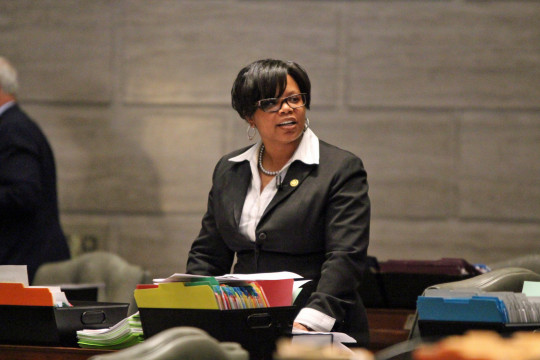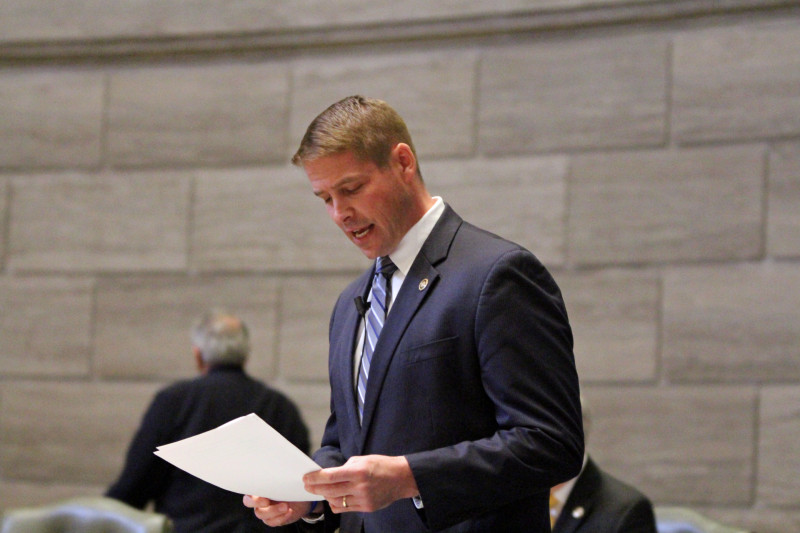JEFFERSON CITY, Mo. – Weeks after the 39-hour filibuster of SJR 39, people around Jefferson City and in the Missouri political sphere figuratively tapped their feet and chewed their fingernails, asking themselves one question.
When would the other big filibuster occur over photo voter ID? The marathon session filibuster over SJR 39, Sen. Bob Onder’s “religious liberties” bill that opponents alleged amounted to discrimination of gay couples, had been a bit of a surprise because most were expecting Senate Democrats to brace for a bigger fight to stop any photo voter ID provision presented before the body. So the question of when lurked as everyone wondered when it would present itself.
That question was answered during Tuesday’s afternoon session when Sen. Will Kraus, R-Lee’s Summit, presented Rep. Justin Alferman’s HB 1631 on the Senate floor. However, the bill was laid over at 7:15 p.m. before the debate went too long.
It will likely be brought up later in the week.
The measure would require photo voter identification at all polling places with certain provisions and exceptions in place designed to assuage fears that the bill could suppress the votes of legal voters to solve a phantom problem – opponents note that voter impersonation, the kind of voter fraud that photo voter ID is designed to prevent, is uncommon. Justin Levitt, a Loyola Law School professor, found that from 2000 to 2014, only 31 incidents of voter impersonation occurred across the entire country.
However, Kraus believes there are reasons why the crime is rarely reported. He offered a study from the New York City Department of Investigation which found that of a random assortment of 175 individuals not eligible to vote in the city, 63 of those individuals were still listed as eligible on the voter registration books.
“DOI investigators posed as the 63 ineligible individuals still on the voter rolls and were permitted to obtain, mark, and submit ballots in the scanners or the lever booths in 61 instances (or approximately 97 percent)”
Kraus argues that this study shows there are certain difficulties in proving in-person voter impersonation fraud especially if those committing the fraud are using the data of those that have become ineligible but still sit on the rolls. Photo voter ID, he says, would solve that problem among others.
“What I’m trying to say is that it’s hard to catch impersonation fraud right now,” Kraus said. “All you have to do is bring your utility bill in, so if you find out someone’s not going to vote, it’s real easy, just get that utility bill and you go down and vote for them. It just doesn’t happen people cause most people that are impersonating don’t go down and vote for someone that’s likely to vote.”
Kraus said a woman in Kansas City had gone through such a situation.
For Kraus, the cause is one he has championed essentially since he reached the Senate, and he believes it will help protect people in the state from certain types of voter fraud, even against allegations that the law could cause those without IDs to not vote.
“Almost every Missourian has an ID and this is about verification at the polls that person is who they say they are,” he said. “It’s just not a problem. There are very few people that don’t have IDs and we can work that system out to make sure everyone has one that doesn’t have one.”

However, opponents, namely Democrats, believe the bill is a way to disenfranchise certain voters, namely minorities, the poor, the elderly and those who live in urban areas, all groups that do not necessarily regularly obtain driver’s licenses, the most common form of photo ID. Sen. Jamilah Nasheed, D-St. Louis, spoke for more than three hours, speaking at length that the bill was an opportunity to suppress the vote of African-Americans as happened before the passage of the Voting Rights Act in 1965.
“This is a horrible bill that needs to go down in flames. It’s not even worth the ink that’s printed on this paper,” Nasheed said. “I’m sure Dr. Martin Luther King is rolling over in his grave today, the day after his assassination… It seems Jim Crow is back knocking on our doors. I thought Jim Crow laws were buried, but I see that’s not the case.”
Nasheed also went through election results from 2006.
Kraus rejected the notion that photo voter ID is voter suppression and instead said it was Democrats who were attempting to do shady things with voter rolls and elections.
“This is their talking point. They don’t want this [bill] because I believe there are some people in their party, maybe not them, that actually want to find a way to cheat elections,” Kraus said. “ If they’re not trying to change the outcome of elections what are they doing?”







